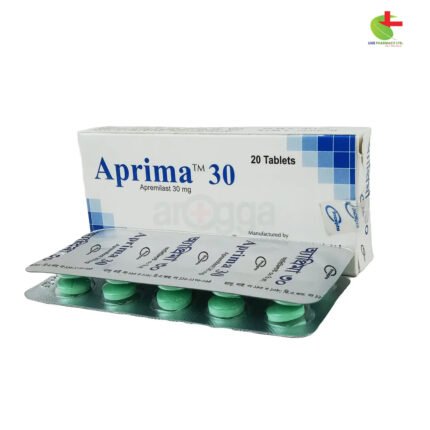Aprima 10
250.00৳ Strip
- Aprima is an oral medication for adults with active psoriatic arthritis and moderate to severe plaque psoriasis, suitable for phototherapy or systemic therapy.
- It inhibits PDE-4, reducing inflammatory mediators to help manage symptoms.
- The recommended dosage involves gradual titration to minimize gastrointestinal side effects, reaching a maintenance dose of 30 mg twice daily.
- Always use this medication as directed by a healthcare professional.
 Brand
Brand
|
Incepta Pharmaceuticals Ltd |
|---|---|
 Generics
Generics
|
Apremilast |
 Type
Type
|
Tablet |
Indications
Aprima is indicated for adults suffering from active psoriatic arthritis and moderate to severe plaque psoriasis who are suitable candidates for phototherapy or systemic treatment.
Use this medication only as directed by a registered healthcare professional.
Pharmacology
Apremilast is an innovative oral small molecule that inhibits type-4 cyclic nucleotide phosphodiesterase (PDE-4). This enzyme, primarily found in inflammatory cells, is responsible for breaking down cyclic adenosine monophosphate (cAMP). By inhibiting PDE-4, Apremilast elevates intracellular cAMP levels, leading to the reduction of various pro-inflammatory mediators, including PDE-4, TNF-alpha, interleukin-2 (IL-2), interferon-gamma, leukotrienes, and nitric oxide synthase. This approach targets a central part of the inflammatory signaling pathway, helping restore the balance between pro- and anti-inflammatory signals.
Dosage & Administration
The recommended initial dosage of Apremilast is titrated from Day 1 to Day 5 as follows. After this 5-day period, the maintenance dose is 30 mg taken twice daily starting on Day 6. This gradual titration is designed to minimize gastrointestinal side effects. Apremilast can be taken with or without food.
- Day 1: 10 mg in the morning
- Day 2: 10 mg in the morning and 10 mg in the evening
- Day 3: 10 mg in the morning and 20 mg in the evening
- Day 4: 20 mg in the morning and 20 mg in the evening
- Day 5: 20 mg in the morning and 30 mg in the evening
- Day 6: 30 mg twice daily
For patients with severe renal impairment, the dosage should be adjusted to 30 mg once daily, with the morning titration schedule being followed and evening doses skipped.
Use this medication only as directed by a registered healthcare professional.
Interactions
The co-administration of strong cytochrome P450 enzyme inducers, such as Rifampin, reduces the systemic exposure of Aprima. Therefore, it is not advisable to use cytochrome P450 enzyme inducers (e.g., Rifampin, Phenobarbital, Carbamazepine, Phenytoin) with Aprima.
Contraindications
Apremilast is contraindicated in individuals with a known hypersensitivity to Apremilast or any of its inactive ingredients.
Side Effects
Common side effects of Aprima include nausea, diarrhea, and headache. Other less common effects may involve upper respiratory tract infections, vomiting, nasopharyngitis, abdominal pain, hypersensitivity, gastroesophageal reflux disease, dyspepsia, fatigue, decreased appetite, cough, rash, and insomnia.
Pregnancy & Lactation
Classified as Pregnancy Category C, it is unclear whether Apremilast or its metabolites are excreted in human milk; however, it has been detected in the milk of lactating mice. Caution is advised when administering Apremilast to nursing women.
Precautions & Warnings
Treatment with Aprima may increase the risk of adverse reactions related to depression. Patients, caregivers, and families should be vigilant for any signs of worsening depression, suicidal thoughts, or mood changes, and should contact a healthcare provider if these occur. Prescribers should carefully consider the risks and benefits of continuing treatment if such events arise.
In clinical studies for psoriatic arthritis, a weight loss of 5-10% was reported in 10% of subjects taking Aprima 30 mg twice daily, compared to 3.3% in the placebo group.
Use in Special Populations
The safety and efficacy of Apremilast in pediatric patients under 18 years have not been established.
Therapeutic Class
Disease-modifying antirheumatic drugs (DMARDs)
Storage Conditions
Store in a cool, dry place, protected from light and moisture. Keep out of reach of children.













Reviews
There are no reviews yet.